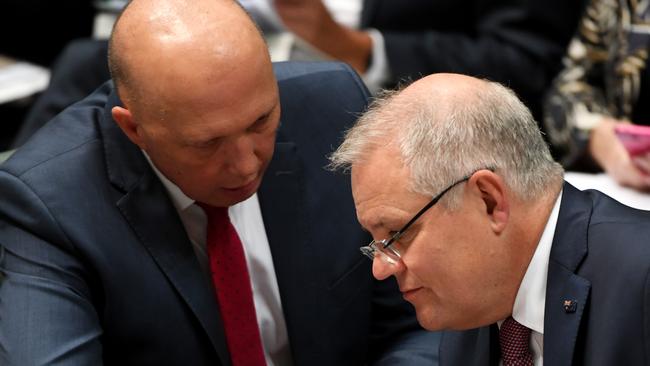With Finance Minister Mathias Cormann announcing his intention to retire from politics at the end of this year, Scott Morrison will need to recalibrate his frontbench. What we won’t know yet is whether the changes will be as minimalist as possible or whether the Prime Minister will go for a significant shake-up to usher out the deadwood and usher in more of his mates.
Either way there are some obvious changes, for better or worse, that may well be on the cards.
First up, surely Morrison will take the opportunity to demote Angus Taylor after all of his controversial failures, both in policy terms and in respect to that police investigation into his use of a fake document to attack Sydney City Council. Taylor, a Rhodes scholar with an impressive pre-parliamentary career and once touted as a future leader of the Liberal Party, has been one of the biggest disappointments of this government.
The only possible reason Morrison wouldn’t remove him is stubbornness; having defended Taylor as long as he has, Morrison may not want to be seen to be dancing to the tune of his critics.
Moving Taylor is made easier by the fact there is a ready-made replacement who could rise straight from the backbench into cabinet: former Australian ambassador to Israel Dave Sharma, the member for Wentworth. Although given the demographics of his electorate, taking over energy policy and the dubious policy settings within it could pose a problem for Sharma. As talented as he is, promotion probably awaits him only if Morrison makes big changes.
A minimalist reshuffle could go something like this: Cormann’s departure frees up the finance portfolio and Senate leadership. In opposition the leadership in the Senate is voted on by Liberals, but in government it is bestowed by the prime minister. The man for the job (because most Liberal representatives are men) is Simon Birmingham. He is expected to go from deputy leader to leader in the Senate and also take over the finance portfolio. Finance ministers are best placed in the Senate, given the Treasurer resides in the House of Representatives.
Birmingham is respected by Morrison without being in the inner sanctum, similar to how Team Morrison viewed Cormann. Birmingham is to the progressives what Cormann was to the conservatives, so by letting this natural transition happen the Prime Minister will be sharing around the Senate leadership factionally.
Moving Birmingham frees up the trade portfolio, which Greg Hunt has long coveted. He’d rather be foreign minister but Marise Payne isn’t going anywhere and the trade portfolio is the next best thing. It would be just reward for the job Hunt has done in the health portfolio during the pandemic, and the end-of-year timing should mean that he wouldn’t be leaving when such a ministerial transition could be seen as dangerous to continuity. A truly minimalist reshuffle could see Sharma move into the trade portfolio instead of Hunt and that would be the end of it. Trade would suit Sharma’s skills set. But I suspect that’s unlikely.
The significance of the health portfolio has been elevated for the foreseeable future. And Morrison will want a safe pair of hands in the role. As tempting as it might be for Morrison to load another portfolio on to Christian Porter’s workload, most would agree the Leader of the House has enough on his plate as Attorney-General and Industrial Relations Minister.
That leaves Defence Minister Linda Reynolds as the best fit to take over health. Morrison likes his military types, we know that; as the highest ranking woman in the defence force during her military service before entering parliament, Reynolds fits the bill. She also has proven to be about as sycophantic towards Morrison as one could imagine, which no doubt he will see as a plus. She is competent and will do the job required in the health portfolio. Just as important, Morrison needs to get her out of the defence portfolio so he can sideline Peter Dutton, or “put him out to pasture”, as one Morrison ally described it to me. Defence, while a senior portfolio, is also the traditional graveyard for senior ministers whom leaders want to sideline from the daily political contest. Dutton is an obvious rival to Morrison given just three votes separated them when Morrison become Prime Minister in 2018.
Dutton is no fan of Morrison, that’s for sure. A move to defence would be a demotion from home affairs but a relatively respectful one. Importantly, Morrison would be sending Dutton a signal in no uncertain terms: your best mate Cormann is gone and I want you out too. Maybe the shift would be enough for Dutton to look to a post-parliamentary career; perhaps even a Campbell Newman-style shift into state politics to save the Liberal National Party from itself.
Either way, Morrison wants Dutton out of the high-profile home affairs portfolio.
How best to fill the home affairs portfolio thereafter is an interesting dilemma for Morrison. He might want to pop his best mate in the parliament, Stuart Robert, into the role, but that carries significant risks.
Many Liberals would have an issue with such a promotion for Robert, not least of whom would be Dutton. To suggest he loathes Robert is to understate his feelings towards the former army officer. Robert hasn’t covered himself in glory during any of his stints as a minister, although his missteps were inherited or not related to his ministerial duties: Robert’s rather large and hard to understand internet bill, for example.
If Robert doesn’t move into home affairs to replace Dutton, who does is an open question. Either way, expect Ben Morton, who is at the epicentre of Team Morrison, to be elevated to cabinet in the next reshuffle. Like Morrison, Morton is a former state party director. Morrison relies on Morton for strategic advice and would feel honour-bound to reward that counsel with cabinet promotion.
Another MP in a similar boat is Alex Hawke, who looks after Morrison’s factional work in his home state, NSW. Hawke is a junior minister and unlikely to move into cabinet. But he could replace David Coleman in a slightly more senior non-cabinet role. Coleman has been on indefinite personal leave since last year, and the time for him to re-enter the ministerial circle or step down will be on us by year’s end, according to sources close to the Prime Minister.
So there you have it: plenty of options, even in the event of minor changes to the frontbench.
Peter van Onselen is a professor of politics and public policy at the University of Western Australia and Griffith University.
More stories on this topic
![]()






